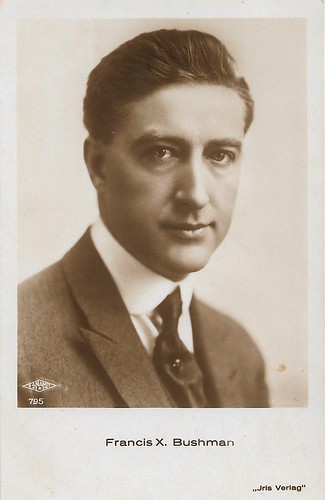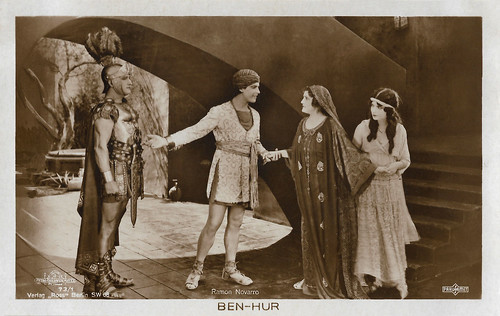
American postcard by Essanay Film Manufacturing Company, Chicago. Photo: The Garraway Company, Rutherford N.J.

German postcard by Ross-Verlag, no. 133/2. Photo: Metro-Goldwyn-Mayer. Publicity still for Ben-Hur (Fred Niblo, 1925).

French postcard by Cinémagazine-Edition, Paris, no. 451. Photo: Metro-Goldwyn-Mayer.
America's most popular leading man
Francis Xavier Bushman was born in Baltimore, Maryland, in 1883. As a young man, he joined the Maryland Athletic Club and began a bodybuilding regimen that would give him his famous film physique. He cited Eugen Sandow as one of his bodybuilding influences.
In New York City, he worked as a sculptor's model, often posing in the nude in sessions. In 1902, he married seamstress Josephine Fladine Duval. By the launch of his film career, the couple had five children.
After appearing in theatre, Bushman was hired by Essanay Studios in Chicago in 1911, launching his film career and stardom. Over the next five years, he appeared generally as the leading man in over a hundred silent films for the studio. The studio's publicity department kept his marriage secret from his fans, who sent him thousands of letters, including marriage proposals.
In 1918, he was the subject of a national scandal as his affair with longtime costar Beverly Bayne became public. Three days after his divorce from Josephine was final, Bushman and Bayne were married; they would eventually have a son.
From 1914 to 1917 Bushman had been America's most popular leading man, but his 1918 divorce revealed to his bevvy of female fans that he was not the eligible bachelor they thought but a married man with five children. In late 1919 and 1920, Bushman and Bayne co-starred in the stage play 'The Master Thief', from a story by Richard Washburn Child, which successfully toured the country.

Vintage postcard. Photo: Essanay.

Austrian postcard by Iris Verlag, no. 795. Photo: Fanamet.

American postcard.
Cast as Messala
Francis X. Bushman eventually retained the services of Harry Reichenbach as his agent. When Bushman noted that he would be well suited to starring in the upcoming film, Ben-Hur: A Tale of the Christ (Fred Niblo, 1925), Reichenbach had the plan to increase his client's marketability.
From a railway station, Reichenbach took Bushman to see studio executives, while dropping pennies to the street from his pocket. Many people followed the two, picking up the coins along the way. The crowd gave the studio executives the impression that Bushman was very popular and they cast him as Messala.
Bushman was concerned that playing a villain would affect his career, so he asked the advice of William S. Hart, who had played the part on stage for years. "Take it,” Hart advised. "It's the best part of the play!" Unlike Ramon Novarro, the star of the picture, Bushman knew how to properly drive a team of horses and a chariot without getting severely injured or killed in the process.
At the peak of his career, Bushman was advertised as "The Handsomest Man in the World". He was also known as "the King of Photoplay" or "the King of Movies" before those titles were more popularly attached to Clark Gable.
Bushman was paid large salaries during his screen career and donated the land upon which Sid Grauman erected his famous Chinese Theater. But his fortune was wiped out in the Wall Street Crash of 1929, and his career as a film star had had its run.

French postcard by Editions Cinematographicques, no. 9. Photo: MGM. Ramon Novarro and Francis X. Bushman in Ben-Hur: A Tale of the Christ (Fred Niblo, 1925).

Austrian postcard by Iris Verlag, no. 775/2. Photo: Fanamet-Film. Francis X. Bushman and Ramon Novarro in Ben-Hur: A Tale of the Christ (Fred Niblo, 1925).

German postcard by Ross Verlag, Berlin, no. 73/1. Photo: Parufamet / Metro-Goldwyn-Mayer. Francis X. Bushman, Ramon Novarro, Claire McDowell and Kathleen Key in Ben-Hur: A Tale of the Christ (Fred Niblo, 1925).
Those We Love
After his film career had waned, Francis X. Bushman made his broadcasting mark on the CBS Radio network's long-running dramatic serial entitled 'Those We Love'. In the soap opera, which ran from 1938 to 1945, he played the role of John Marshall, father of twins played by Richard Cromwell and Nan Grey. Robert Cummings rounded out the cast.
Bushman took small roles in films and attempted to run a few small businesses, all of which lost money. In later years, Bushman made assorted guest appearances on American television in the 1950s and 1960s, including in Burns and Allen, Peter Gunn, Perry Mason, The Adventures of Ozzie and Harriet, and Dr. Kildare
Bushman guest-starred as well in 1966 on a two-part episode of Batman. It was his last screen appearance. Bushman's role was as a wealthy collector of silent pictures and promoter of a silent film festival.
In 1966, Francis X. Bushman suffered a heart attack and died at his home in Pacific Palisades, California. He was interred at Forest Lawn Memorial Park Cemetery in Glendale, California. He was married four times, to Josephine Fladine Duval (1902-1918), Beverly Bayne (1918-1925), Norma Emily Atkin (1932-1956 - her death), and Iva Millicent Richardson (1956-1966 - his death).
Bushman had six children. One of his sons, Ralph Everly Bushman (1903-1978), was also an American actor who appeared in 61 films between 1920 and 1943. He often was credited as Francis X. Bushman Jnr. Although he appeared in more than 60 films, Ralph Bushman never became as well known as his famous father.

American postcard by Pomegranate, Rohnert Park, CA, no. 2711. Photo: MGM / Underwood Photo Archives Ltd, San Francisco. Francis X. Bushman in Ben-Hur: A Tale of the Christ (Fred Niblo, 1926).

French postcard in the Les Vedettes de Cinéma Series, by A.N., Paris, no. 232. Photo: Metro-Goldwyn. This postcard does not show the famous actor from the silent 1925 epic Ben-Hur, but his lesser-known son Ralph often indicated as Francis X. Bushman junior.

British postcard in the Picturegoer Series, London, no. 358. Francis X. Bushman junior.
Sources: Wikipedia and IMDb.
No comments:
Post a Comment